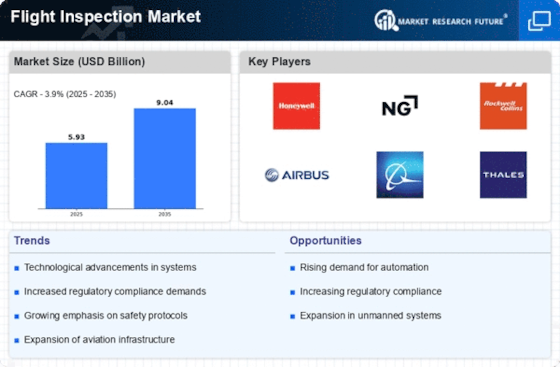Market Analysis
In-depth Analysis of Flight Inspection Market Industry Landscape
The Flight Inspection Market is characterized by dynamic elements that underscore the crucial importance of maintaining and enhancing the safety and performance of airspace operations. A fundamental marketplace dynamic is the stringent regulatory framework governing aviation protection. The aviation government, which includes the Federal Aviation Administration (FAA) and the European Union Aviation Safety Agency (EASA), mandates normal Flight Inspections to assess and validate the accuracy and functionality of navigation aids, verbal exchange systems, and surveillance gadgets. The expansion and modernization of airports worldwide pressure the dynamics of the Flight Inspection Market. Airports are hubs of connectivity, and their navigation and communique systems have to meet high standards of accuracy and reliability. Flight Inspection offerings are crucial for validating and calibrating Instrument Landing Systems (ILS), Very High-Frequency Omni-Directional Range (VOR) stations, and different essential aids for secure plane operations. The increasing consciousness of safety and the reduction of aviation-related accidents contribute to the dynamics of the Flight Inspection Market. Flight Inspection performs a vital role in improving the protection of air tours by ensuring that navigation aids, approach processes, and communication structures meet stringent safety standards. The marketplace dynamics are formed via the vital to prevent injuries due to inaccuracies or malfunctions in crucial navigation and communique infrastructure. Flight Inspection offerings are imperative to the proactive method of figuring out and rectifying capacity protection risks inside the airspace surroundings. Market dynamics are also encouraged by the developing emphasis on performance-based navigation (PBN) and satellite-primarily based navigation technologies. Flight Inspection structures equipped with specialized equipment for validating Global Navigation Satellite Systems (GNSS) and PBN techniques turn out to be critical for maintaining the integrity of modern-day airspace infrastructure. The globalization of air journeys contributes to the dynamics of the Flight Inspection Market, necessitating harmonized requirements and interoperability in navigation and communication systems. Flight Inspection services play a crucial function in ensuring consistency and compliance with worldwide aviation standards. The Flight Inspection Market is prompted by regulatory requirements, technological improvements, international air site visitors' growth, airport growth and modernization, protection issues, the adoption of PBN and satellite TV for PC-primarily based navigation technology, and the globalization of air travel. The dynamics of the marketplace underscore the essential role of Flight Inspection services in retaining the safety, accuracy, and efficiency of airspace operations. As aviation continues to evolve and embody new technology, the Flight Inspection Market will adapt to fulfill the challenges and requirements of contemporary airspace control.


















Leave a Comment